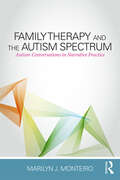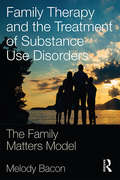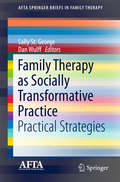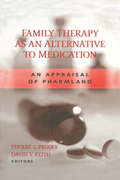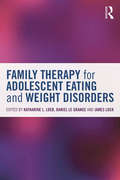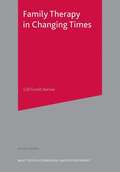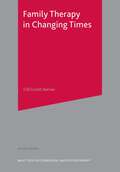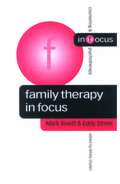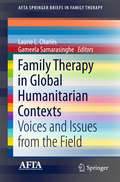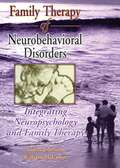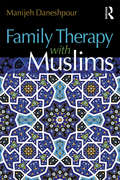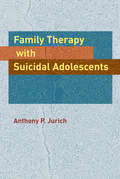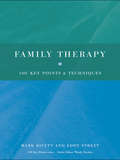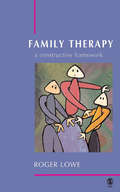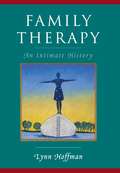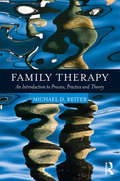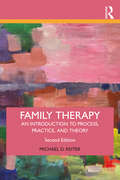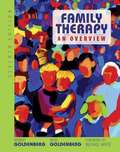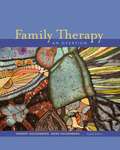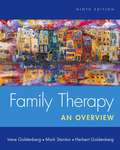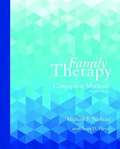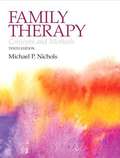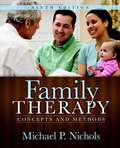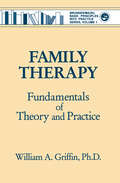- Table View
- List View
Family Therapy and the Autism Spectrum: Autism Conversations in Narrative Practice
by Marilyn J. MonteiroThe autism spectrum presents a range of communication, social, and sensory differences that are challenging for clinicians to address. Family Therapy and the Autism Spectrum provides a guide to conceptualizing those differences and ways to discuss them with clients and their families. Readers are provided with narrative examples illustrating the application of key concepts introduced in the text. These case examples address issues that range across the life cycle, from families with young children to ones with teens who are emerging as adults. Using the techniques learned in this book, clinicians will be able to guide families towards their positive autism narrative. This book also features a visual framework to organize the compelling narrative of each person’s autism spectrum pattern of developmental differences or brain style. Using this visual framework and the corresponding descriptive language, clinicians and families can work together to create their "autism conversations." The conversations lead to the transformative experiences of developing competencies, resiliency, and advocacy for individuals and their families. The conversations also lead individuals with spectrum differences to use empowering language, supporting their ability to develop self-advocacy and self-determination skills.
Family Therapy and the Treatment of Substance Use Disorders: The Family Matters Model
by Melody BaconThis accessible guide offers a much-needed integration of family therapy into the treatment of substance use disorders. By proposing a means by which family therapy can be moved to the forefront of addiction treatment, it places the family perspective at the center of its approach and provides a multifaceted alternative to the prevalent individual-focused model. Drawing from Bowen Family Systems Theory and the principles of the 12 step program, the book presents a model of integration that addresses the needs of families struggling with addiction. Illustrated with discussion questions and case narratives of former addicts, the text guides both practitioners and families towards a goal of creating an environment that supports recovery. Offering an overview of the history and current models of addiction treatment, chapters also outline a 6 week Family Matters Program, with accompanying treatment interventions and case studies. The book concludes with an examination of how this program can be implemented by practitioners in a variety of clinical settings. Family Therapy and the Treatment of Substance Use Disorders is essential reading for anyone with an interest in understanding the diverse ways in which addiction affects families. It will be particularly relevant to students of family therapy, but clinicians who work across the fields of substance abuse treatment or family counseling will also benefit from reading this book.
Family Therapy as Socially Transformative Practice
by Sally St. George Dan WulffThis thorough reviewof social justice in family therapy guides practitioners to incorporateconcepts of equity and fairness in their work. Expanding on the relationshipsbetween larger social contexts and individuals' family functioning, it offers practicalstrategies for talking with families about power disparities, injustice, and respect,and for empowering clients inside and outside the therapy room. Case studiesand discussions with therapists illustrate how family challenges are commonly exacerbatedoutside the home, and the potential for this understanding to help clients worktoward positive change while improving therapists' professional development. Thebook's accessible, solution-focused approach shows small therapeutic steps changingfamilies, communities, and clinical practice for the better. Included in thecoverage: Family therapy + social justice + daily practices = transforming therapy. Researcher as practitioner: practitioner as researcher. Learning to speak social justice talk in family therapy. Supporting the development of novice therapists. Everyday solution-focused recursion: when family therapy faculty, supervisors, researchers, students, and clients play well together. Family therapy stories: stretching customary family therapy practices. At once down-to-earth and inspiring, Family Therapy as SociallyTransformative Practice is a must read for those interested in familytherapy and family-centered practices and policies.
Family Therapy as an Alternative to Medication: An Appraisal of Pharmland
by Msw Phoebe S. Prosky David V. KeithFirst Published in 2003. Routledge is an imprint of Taylor & Francis, an informa company.
Family Therapy for Adolescent Eating and Weight Disorders: New Applications
by Daniel Le Grange James Lock Katharine L. LoebFamily-based treatment (FBT) for eating disorders is an outpatient therapy in which parents are utilized as the primary resource in treatment. The therapist supports the parents to do the work nurses would have done if the patient were hospitalized to an inpatient-refeeding unit, and are eventually tasked with encouraging the patient to resume normal adolescent development. In recent years many new adaptations of the FBT intervention have been developed for addressing the needs of special populations. This informative new volume chronicles these novel applications of FBT in a series of chapters authored by the leading clinicians and investigators who are pioneering each adaptation.
Family Therapy in Changing Times
by Gill Gorell BarnesThe new edition of this well-known text addresses the plurality of family life today, and considers the way in which the changeable 'theory of family' has influenced the approaches of those working with families. The emphasis in this second edition is on working in a context of cultural diversity and in which life transitions such as marriage, divorce and bereavement, affect the lives of all families, be they multi- or lone-parent, gay or heterosexual. This is an essential text for therapists and counsellors, both in training and in practice, who work with families.
Family Therapy in Changing Times (Basic Texts in Counselling and Psychotherapy)
by Gill Gorell BarnesThe new edition of this well-known text addresses the plurality of family life today, and considers the way in which the changeable 'theory of family' has influenced the approaches of those working with families. The emphasis in this second edition is on working in a context of cultural diversity and in which life transitions such as marriage, divorce and bereavement, affect the lives of all families, be they multi- or lone-parent, gay or heterosexual. This is an essential text for therapists and counsellors, both in training and in practice, who work with families.
Family Therapy in Focus (Counselling & Psychotherapy in Focus Series)
by Mark Rivett Dr Eddy StreetDrawing on many years' experience in practice, teaching and research, Mark Rivett and Eddy Street present philosophical, sociological and empirical views of family therapy. Balancing the perceived benefits against the potential limitations, they pose questions, which challenge those within the profession to think hard about their role. } does family therapy work? } can those most in need really be helped? } is family therapy a means of social control? } who does professionalization help? While most texts offer a straightforward and uncritical perspective, in contrast Family Therapy in Focus aims to stimulate debate among practitioners and to help trainees adopt a more reflective and critical attitude towards their own professional development and the development of their profession.
Family Therapy in Global Humanitarian Contexts
by Laurie L. Charlés Gameela SamarasingheThis book brings together a diverse set of clinicians, scholars, and researchers actively using systemic family therapy ideas within the context of ongoing or recent humanitarian intervention. The contributions focus on critical issues specific to the practice of family therapy within global mental health contexts, with a particular attention to the humanitarian sphere. Issues covered include treatment across cultures and language barriers, work in settings with covert and overt threats, practice in low-resource situations, and the creation of a family therapy program that relates to peace-building, reconciliation, and post-war discourse. The diverse group of authors contributes practical information and content specific to the training, supervision and/or delivery of family-based services, and offer specific principles and recommendations for family therapy practitioners and researchers.
Family Therapy of Neurobehavioral Disorders: Integrating Neuropsychology and Family Therapy
by William G. McCown Judith L JohnsonFamily Therapy of Neurobehavioral Disorders shows you a unique integration of neuropsychology and family therapy. Authors Judith L. Johnson and William G. McCown span these two broad areas by synthesizing family therapy principles and applying them specifically to traumatic brain injury and degenerative dementia. Family therapists, neuropsychologists, social workers, and counselors working with patients who experience brain dysfunction and their families learn to better address common issues and problems and of therapeutic interventions. This expert book includes case examples and working models of family reactions. The book then extends this information into practical clinical situations commonly confronted in work with these patients and their families. Readers of Family Therapy of Neurobehavioral Disorders are introduced to brain-behavior relationships including neuroanatomy of the brain as it relates to behavior, dynamics of neurologic disorders, and common symptoms of brain dysfunction. You can then use this information to help persons with traumatic brain injury and their families cope with and adjust to the issues and challenges they face. Specifically, you gain invaluable, informative insight into: the neuroanatomy of the brain and which structures mediate behavior, emotion, and cognition common issues families face when a member suffers traumatic brain injury therapeutic strategies and practical suggestions for assisting families mild head injury and familial reactions common issues faced by families confronting Alzheimer’s disease or other dementias a model of family reactions to dementia over timeChapters in Family Therapy of Neurobehavioral Disorders outline symptoms of brain dysfunction and family therapy designed to approach these symptoms. Divided into two sections, the book gives readers a model of traumatic brain injury beginning with the initial onset and proceeding through time. This section focuses on changes within the family and therapeutic strategies for helping these distressed families. Secondly, the authors address degenerative dementia with emphases on certain phases through which family members may progress as they acknowledge their loved one’s condition and then therapeutically work through the reality of it. Professionals in the medical and social sciences will find Family Therapy of Neurobehavioral Disorders a unique and irreplacable guide for developing and understanding the meshing of neuropsychology and family therapy. Also, the book serves as a solid text for students in courses such as rehabilitation, counseling, and family therapy.Translated into Spanish!
Family Therapy with Adolescents in Residential Treatment: Intervention and Research (Focused Issues in Family Therapy)
by Jacob D. Christenson Ashley N. MerrittsThis highly practical resource integrates the powerful dynamics of family into residential treatment and outdoors-based therapy for young people. Recognizing both the family as the systemic base for promoting change in adolescents and the therapeutic potential of the residential/wilderness setting, experts show how aligning the two can enhance the healing value of the program while promoting higher standards for care. Chapters describe innovative, science-based interventions and techniques for treating common behavioral and emotional problems along a continuum of family involvement and separation, to address issues affecting the family as well as the identified patient. With its accessible ideas and compelling case studies, the book ably demonstrates the critical role of family in adolescent patients’ successful transition to post-treatment life. Among the topics covered:• A parallel process: home therapy while the adolescent or young adult is in residential care.• Intentional separation of families: increasing differentiation through wilderness therapy.• Emerging family therapy models utilized in residential settings.• Engaging families in Outdoor Behavioral Healthcare.• Research on coping skills used by youth with emotional and behavioral disorders.• Expanding our understanding of the place of family therapy in residential treatment.Family Therapy with Adolescents in Residential Treatment offers novel, exciting, and effective strategies and techniques for practitioners and mental health professionals particularly interested in family therapy with adolescents, and in related interventions and research.
Family Therapy with Muslims
by Manijeh DaneshpourFamily Therapy with Muslims is the first guide for mental health professionals who work with Muslims in the family therapy setting. The book opens with a section defining the similarities across Muslim cultures, the effects of postcolonialism on Muslims, and typical Muslim family dynamics. The author then devotes a chapter to different models of family therapy and how they can specifically be applied to working with Muslim families. Case studies throughout the book involve families of many different backgrounds living in the West—including both immigrant and second generation families—that will give professionals concrete tools to work with clients of their own.
Family Therapy with Suicidal Adolescents
by Anthony P. JurichThis book describes a blend of insight-oriented, behavioral, and strategic family therapy, which the author has developed over thirty-four years of dealing with suicidal adolescents. It aims not to replace other forms of therapy but to augment the therapist’s own therapeutic style. The book offers an informative and personally told story bringing together scholarship and meaningful glimpses into the thought processes of suicidal youth. Written in an understandable, friendly, and practical style, it will appeal to those in clinical practice, as well as graduate-level students pursuing clinical work.
Family Therapy: 100 Key Points and Techniques (100 Key Points)
by Mark Rivett Eddy StreetFamily therapy is increasingly recognised as one of the evidence based psychotherapies. In contemporary therapeutic practice, family therapy is helpful across the age span and for distress caused by family conflict, trauma and mental health difficulties. Because of this, many psychotherapists integrate elements of family therapy within their approaches. Family Therapy: 100 Key Points and Techniques provides a concise and jargon-free guide to 100 of the fundamental ideas and techniques of this approach. Divided into helpful sections, it covers: Family therapy theory Essential family therapy practice Using family therapy techniques Common challenges in family therapy Contemporary debates and issues Self issues for family therapists. Family Therapy: 100 Key Points and Techniques is an invaluable resource for psychotherapists and counsellors in training and in practice. As well as appealing to established family therapists, this latest addition to the 100 Key Points series will also find an audience with other mental health professionals working with families and interested in learning more about family therapy techniques.
Family Therapy: A Constructive Framework
by Dr Roger Lowe`I liked this book. Though I am not a family therapist, like most mental health nurses I try to bear in mind the family relationships of individuals I am working with. This is an enlightening text which not only offer a framework with which we can better understand the severe psychopathologies seen in forensic work, but also gives examples of how it may be used therapeutically' - Mental Health Practice `I think this is an important book that crystallises complex theory into a user-friendly model, using case material and discussions from the therapeutic community. A must have for counsellors working with families, this will form part of the recommended reading on the Family Counselling course' - Barbara McKay, Relate Head of Training, Relate News `The book provides a good overview of a number of recent approaches to working with families as well as how the author thinks about them' - Stephen Bray, Nurturing Potential `Roger Lowe achieves the almost impossible task of bringing together various theories, techniques and case examples in clear and accessible ways. Readers of all disciplines, from front-line hard-pressed practitioners to students on therapy and social work courses, will be grateful for the simple and, above all, useful way he tackles the burning questions that arise in working with the family group. Highly recommended!' - Harvey Ratner, Brief Therapy Practice, London Family Therapy introduces practitioners to the principles of using a constructive and collaborative approach with families. The approach builds on a strengths-based philosophy and focuses on enhancing family resilience and competence in a way that is both time-efficient and comprehensive. It brings together skills from contemporary models such as solution-focused, narrative and conversational therapies and adapts them to the specific challenges of working with family relationships. It is the first book to systematically integrate these influential approaches and apply them to family work. Setting out a clear framework for practice, Roger Lowe describes the key tasks for the therapist as: · hosting meetings · negotiating concerns, and · evoking family members' personal and relationship resources. The framework is designed to be clear but flexible, and to allow practitioners to adapt it to their own situational needs. For example, it suggests ways for practitioners to selectively 'borrow' from other therapeutic models while retaining a constructive orientation. It also explores ways in which therapists can use their 'inner' conversation during a session as a tool to overcome obstacles to the therapeutic process. Although there is a common belief that the approach is only suited to brief interventions, the author also describes ways of working constructively over a longer period of time. Throughout the book, case studies are included to show how the constructive framework is used in practice and to highlight a range of challenging situations that may be encountered during family therapy. Roger Lowe's book provides a refreshingly different approach to working with families, which chimes with the growing interest in constructive approaches. It is written for trainees and for practitioners who are interested in developing their skills in this collaborative and optimistic approach.
Family Therapy: An Intimate History
by Lynn HoffmanThis book follows the journey of one highly curious and questing therapist from an instrumental, causal approach to family therapy to a collaborative, communal one. Because Lynn Hoffman has been in the field for almost forty years and has worked with so many of its influential thinkers, the book is also a history of family therapy's evolution. Her knowledge of family therapy is intimate and deep; her perspective is clear-eyed and often wryly humorous. Readers will be reminded that, however big and impressive the theories, family therapy is very much a human endeavor. Hoffman revisits the experiences, ideas, and relationships that have informed her journey and presents them both as she perceived them at the time and as she perceives them now looking back. Through this process of reflective conversation, she creates not only a legacy out of the people and situations that acted on her most powerfully but also a countertradition to the strategic approach that influenced her so strongly early in her career. But this is not just history. Throughout her career Hoffman has been in the forefront of family therapy. She has interacted with and sometimes worked closely with many of family therapy's influential thinkers and actors, including Jay Haley, Virginia Satir, Dick Auerswald, Harry Aponte, Peggy Papp, Olga Silverstein, the Milan team, Peggy Penn, Harry Goolishian, Harlene Anderson, Tom Andersen, and Michael White. The evolution of her thinking has paralleled the major developments in the field. As she braids together continuity and innovation, she finds her own voice—a 'different voice'—and her own style—more open, more inclusive, and less controlling. In the second half of the book Hoffman demonstrates the many possibilities inherent in 'not knowing,' in working with a reflecting team, in looking for the 'presenting edge,' and in grabbing the 'emotional main chance.'
Family Therapy: An Introduction to Process, Practice and Theory
by Michael D. ReiterFamily Therapy: An Introduction to Process, Practice and Theory is a primer for students, professionals, and trainees to understand how family therapists conceptualize the problems people bring to therapy, utilize basic therapeutic skills to engage clients in the therapeutic process, and navigate the predominant models of family therapy. This text walks readers through each of these main areas via a straightforward writing style where they are provided with exercises and questions to help them develop the basic concepts and tools of being a family therapist. Upon finishing this book, students will have the foundational skills and knowledge needed to work relationally and systemically with clients.
Family Therapy: An Introduction to Process, Practice, and Theory
by Michael D. ReiterFamily Therapy, second edition, is a fully updated and essential textbook that provides students and practitioners with foundational concepts, theory, vocabulary, and skills to excel as a family therapist.This book is a primer of how family therapists conceptualize the problems that people bring to therapy, utilize basic therapeutic skills to engage clients in the therapeutic process, and navigate the predominant models of family therapy. The text walks readers through the process of thinking like a family therapist, and each chapter utilizes various learning tools to help the reader further understand and apply the concepts. Chapters explore the history, context, and dominant theories of family therapy, as well as diversity, ethics, empathy, structuring sessions, and assessment. Written in a comprehensive and approachable style, this text provides readers with the foundational skills and tools essential for being a family therapist, and allows students and practitioners to work relationally and systemically with clients. The second edition widens its scope of the family therapy field with updated research and four brand-new chapters.This is an essential text for introductory family therapy courses and a comprehensive resource for postgraduate students and the next generation of family therapists.
Family Therapy: An Overview (7th edition)
by Herbert Goldenberg Irene GoldenbergFirst published in 1980, this updated textbook--now in its seventh edition--provides an overview of the major theoretical underpinnings of family therapy and describes current clinical practices. Clinical cases illustrate the application of a particular set of techniques for each of the established schools of family therapy. Newer models, such as the social constructionist views, are also discussed. The volume concludes with a comparative overview of family theories and therapies.
Family Therapy: An Overview (Eighth Edition)
by Herbert Goldenberg Irene GoldenbergFAMILY THERAPY provides a balanced presentation of the major theoretical underpinnings and clinical practices in the field. By presenting an overview of traditional and evolving viewpoints, perspectives, values, intervention techniques, and goals of family therapy, Herbert and Irene Goldenberg provide current, relevant, practice-oriented content laying the foundation for students to become proficient family therapists. This edition reflects the Goldenbergs' commitment to providing students with not only traditional family therapy theoretical frameworks but also the field's evolving models of practice. It is the complete resource for assisting students in mastering the many facets of family therapy. For this edition, Michael White, founder of Narrative Therapy, has written a new foreword for the book.
Family Therapy: An Overview Ninth Edition
by Herbert Goldenberg Irene Goldenberg Mark StantonCompletely up-to-date, this engaging and practice-oriented text is your complete resource to help students master the many facets of family therapy. In this ninth edition, the authors provide practice-oriented content in a more concise format that will help students become empathic and effective family therapists. New material focuses on how students can practice systemic thinking and on how to develop core competencies in family therapy. There is also increased attention to LGBTQ families and alternative forms of family life, and to gender, culture, and ethnic considerations. Color-coded boxes highlight key aspects of family therapy, such as family diversity, evidence-based practice research, "Thinking Like a Clinician" student exercises, case studies, clinical notes, and therapeutic encounters.
Family Therapy: Concepts and Methods
by Sean Davis Michael NicholsLong considered the standard of excellence--the best introduction and guide to the practice of family therapy available--this accessible resource explores the rich history and contemporary practice of the entire field. Thorough, thoughtful, fair, and balanced, Family Therapy by Michael P. Nichols presents ideas and techniques that give readers a clear focus on clinical practice. While exploring the history, the classic schools, and the latest developments, this new edition puts an increased, pragmatic focus on clinical practice, which includes discussions of the author's observations of actual sessions with leading practitioners, as well as the best case studies of several invited master therapists. Included are video links, interactive chapter quizzes, new case studies, a new section on the impact of the Affordable Care Act, and many more content changes that bring the reader up to date on the latest and most critical issues in the field of family therapy today. The Enhanced Pearson eText features embedded videos and assessments
Family Therapy: Concepts and Methods (10th Edition)
by Michael P. Nichols Richard C. SchwartzMike Nichols' engaging yet thorough guide has long been the standard in family therapy. The author describes and analyzes the field of family therapy, covering its history, schools, and developments. Numerous cases help readers appy theories to real situations and make the text even more engaging. Upon completing this book, readers will be able to: Describe clinical approaches Understand old and new developments in the field of family therapy Analyze successes and failures in research and the impact on current clinical practices Compare different schools of family therapy and explain the contemporary status of distinct schools of therapy
Family Therapy: Concepts and Methods (9th Edition)
by Michael P. Nichols Richard C. SchwartzFamily Therapy: Concepts and Methods is the definitive, classic in the field and covers all the major schools and developments in Family Therapy. Just some of the features that make this book so widely used -- Brief biographies and photos of some of the leading family therapists of the twentieth century; Extensive coverage of professional ethics, reflecting the need for students to have increased awareness of professional issues in family therapy; Unique issues family therapists encounter when providing home-based services; Latest research and data - often before that research is published in other forums. The Ninth Edition continues this tradition with many exciting revisions including: several new case studies a new summary of major theoretical concepts a new section on working with common forms of family triangles new sections on Sex and the Internet and Neuroscience and Relationships and much more! From the Preface - "One thing that tends to get lost in academic discussions of family therapy is the feeling of accomplishment that comes from sitting down with an unhappy family and being able to help them. Beginning therapists are understandably anxious and not sure they'll know how to proceed. ("How do you get all of them to come in?") Veterans often speak in abstractions. They have opinions and discuss big issues-postmodernism, narrative reconstructionism, second-order cybernetics. While it's tempting to use this space to say Important Things, I prefer to be a little more personal. Treating troubled families has given me the greatest satisfaction imaginable, and I hope that the same is or will be true for you." - Michael P. Nichols
Family Therapy: Fundamentals Of Theory And Practice
by William A. GriffinFirst published in 1993. Routledge is an imprint of Taylor & Francis, an informa company.
